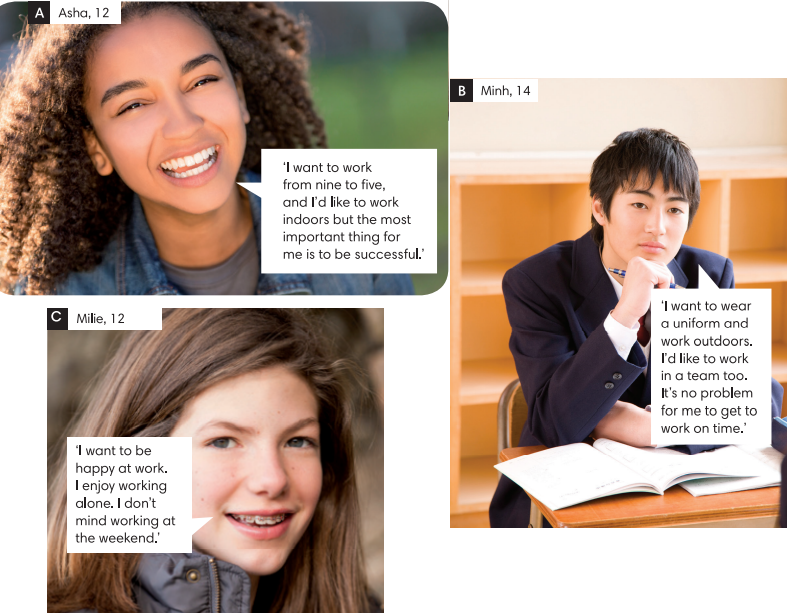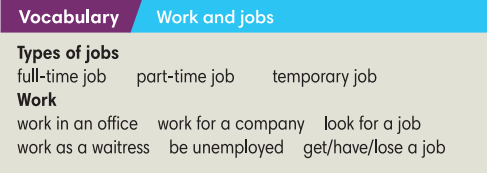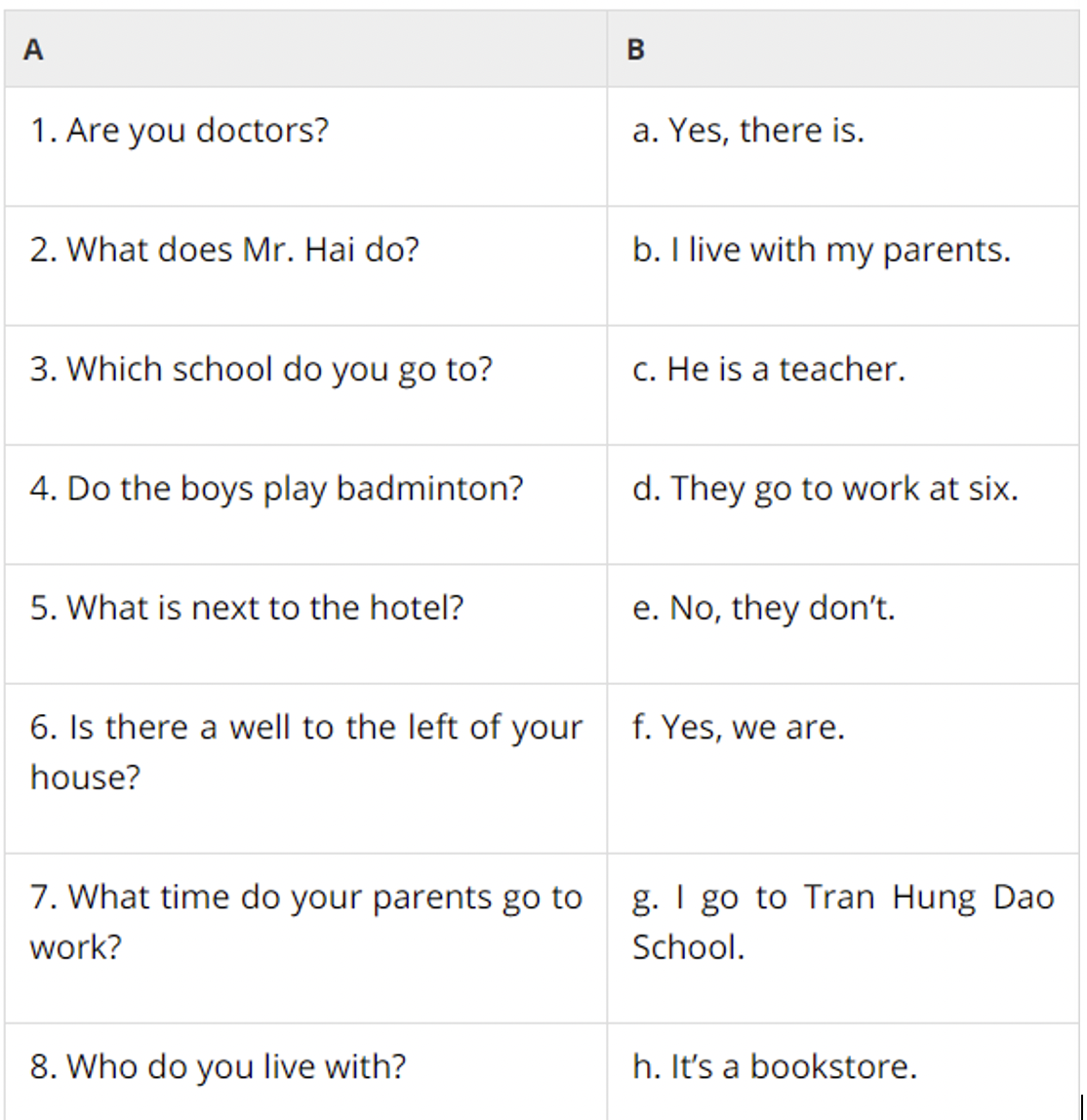3. Read the text. Mark the sentences ✓ (right), X (wrong) or ? (doesn't say).
(Đọc văn bản. Đánh dấu các câu ✓ (đúng), X (sai) hoặc ? (không đề cập đến).)
|
✓ |
1. The writer believes that children often want to have the same job as famous people or people they know. |
|
|
2. The writer wanted to be on television. |
|
|
3. The writer works on television now. |
|
|
4. Boys and girls have different types of dream jobs. |
|
|
5. Today's children will earn more than their parents did. |
|
|
6. It isn't a good idea to have an unrealistic dream. |
|
|
7. The writer thinks that people's dreams stay the same through their lives. |
What was your dream?
What were your dreams and ambitions when you were a child? Are your dreams the same now? Nearly all children have a dream for the future. Sometimes they want to be like people they see on television or someone in their family. When I was a child I wanted to be a lawyer because I admired the lawyer in a TV drama! My sister wanted to be a princess!
A recent survey asked 11,000 seven-year-olds about their ambitions and the results were interesting. Most of them had definite ideas about their future careers. The most popular jobs included teacher, scientist, firefighter and police officer. In general boys wanted to earn a lot of money (a third of them wanted to become a footballer or sportsman) and girls preferred a job helping people, like a doctor or teacher.
Experts say that today's children have greater ambitions than their parents had and this is a very good thing. People who have a dream will work harder and have fewer problems. Sometimes those dreams aren't realistic and they change. Not every seven-year-old boy will become a rich and successful footballer! I didn't become a lawyer - and surprisingly, my sister didn't become a princess! But it is important to be ambitious, We all need to dream.
Tạm dịch:
Bạn đã có ước mơ và hoài bão gì khi còn nhỏ? Giấc mơ của bạn bây giờ có giống nhau không? Gần như tất cả trẻ em đều có ước mơ cho tương lai. Đôi khi họ muốn giống như những người mà họ thấy trên truyền hình hoặc một người nào đó trong gia đình của họ. Khi tôi còn là một đứa trẻ, tôi muốn trở thành một luật sư vì tôi ngưỡng mộ luật sư trong một bộ phim truyền hình! Em gái tôi muốn trở thành một công chúa!
Một cuộc khảo sát gần đây đã hỏi 11.000 trẻ 7 tuổi về tham vọng của chúng và kết quả thật thú vị. Hầu hết họ đều có những ý tưởng xác định về nghề nghiệp tương lai của họ. Các công việc phổ biến nhất bao gồm giáo viên, nhà khoa học, lính cứu hỏa và cảnh sát. Nhìn chung, con trai muốn kiếm được nhiều tiền (một phần ba trong số họ muốn trở thành cầu thủ bóng đá hoặc vận động viên thể thao) và con gái thích một công việc giúp đỡ mọi người, như bác sĩ hoặc giáo viên.
Các chuyên gia nói rằng trẻ em ngày nay có tham vọng lớn hơn cha mẹ của chúng và đây là một điều rất tốt. Những người có ước mơ sẽ làm việc chăm chỉ hơn và gặp ít vấn đề hơn. Đôi khi những giấc mơ đó không thực tế và chúng thay đổi. Không phải cậu bé bảy tuổi nào cũng sẽ trở thành một cầu thủ bóng đá giàu có và thành công! Tôi đã không trở thành một luật sư - và thật ngạc nhiên, em gái tôi đã không trở thành một công chúa! Nhưng điều quan trọng là phải có hoài bão. Tất cả chúng ta cần phải mơ ước.
|
✓ |
1. The writer believes that children often want to have the same job as famous people or people they know. (Tác giả tin rằng trẻ em thường muốn có công việc giống như những người nổi tiếng hoặc những người mà chúng biết.) |
|
X |
2. The writer wanted to be on television. (Tác giả muốn được lên truyền hình.) |
|
? |
3. The writer works on television now. (Nhà văn hiện làm việc trên truyền hình.) |
|
✓ |
4. Boys and girls have different types of dream jobs. (Con trai và con gái có nhiều loại công việc mơ ước khác nhau.) |
|
? |
5. Today's children will earn more than their parents did. (Con cái ngày nay sẽ kiếm được nhiều tiền hơn cha mẹ chúng đã từng.) |
|
X |
6. It isn't a good idea to have an unrealistic dream. (Ước mơ viển vông không phải là một ý kiến hay.) |
|
X |
7. The writer thinks that people's dreams stay the same through their lives. (Tác giả cho rằng ước mơ của mọi người vẫn không thay đổi trong suốt cuộc đời của họ.) |

Các bài tập cùng chuyên đề
4. Check if you understand these Word Friends. Then find jobs from the Vocabulary box for Asha, Minh and Millie. There is more than one job for each person.
(Kiểm tra xem bạn có hiểu những Người Bạn Từ này không. Sau đó, tìm việc làm từ ô Từ vựng cho Asha, Minh và Millie. Có nhiều hơn một công việc cho mỗi người.)

1. Read the text. What jobs did the people have when they were young?
(Đọc văn bản. Khi còn nhỏ mọi người đã làm những công việc gì?)
Johnny Depp: Some celebrities know what it's like to look for a job and to work from nine to five. For example, did you know that Johnny Depp sold pens in a call centre before he became an actor? It's hard to believe but it's true.
And Johnny Depp is not the only famous person who had a normal job before becoming famous. Model Megan Fox worked as a waitress. Beyoncé helped out at her mother's beauty salon. Jennifer Lopez (JLo) had a temporary job in a lawyer's office. And Tom Cruise had a part-time job delivering newspapers.
Beyoncé: Some celebrities had jobs that don't seem surprising. Writer J.K. Rowling was an English teacher. She had a full-time job in a school in Portugal before she wrote about Harry Potter.
But other famous people had more surprising jobs. Brad Pitt, for example, once got a very strange job. He had to dress up as a giant chicken to attract customers to a restaurant! It was better than being unemployed but I'm sure he wasn't upset when he lost that job.
2. Read the two texts. Mark the sentences ✓ (right), X(wrong) or ? (doesn't say).
(Đọc hai đonạ văn. Đánh dấu ✓ (đúng), X (sai) hoặc ? (không được đề cập đến).)
x 1. In the writer's opinion famous people don't know about normal people's lives.
(Theo quan điểm của nhà văn, những người nổi tiếng không biết về cuộc sống của những người bình thường.)
___ 2. Johnny Depp sold the writer a pen.
(Johnny Depp đã bán một cây bút cho nhà văn.)
___ 3. JLo's mother helped her get a job.
(Mẹ của JLo đã giúp cô ấy có một công việc.)
___ 4. J.K. Rowling taught English when she was younger.
(J.K. Rowling dạy tiếng Anh khi cô còn nhỏ.)
___ 5. Brad Pitt once had a very unusual job.
(Brad Pitt từng có một công việc rất bất thường.)
3. Find the phrases below in the text. How do you say them in your languages?
(Tìm các cụm từ dưới đây trong văn bản. Làm thế nào để bạn nói chúng bằng ngôn ngữ của bạn?)

4. Use the phrases or part of the phrases in the Vocabulary box to complete the text. Listen and check.
(Sử dụng các cụm từ hoặc một phần của các cụm từ trong hộp Từ vựng để hoàn thành văn bản. Nghe và kiểm tra.)
I don't have a full-time job. I have two part-time jobs. In the morning, I work 2________ the town council. I'm a gardener. And in the evening, I work 3______ a waiter in a café. It’s tiring
but I don't want to be 4______ I want to earn more money so I'm 5_______ for a new job but it’s difficult to 6______ a good job. Last year I had a 7_______ job for the summer in a restaurant at the beach. The money was great! Unfortunately, I 8______ my job when autumn came.
4. Listen again and check if the following statements are true or false. Write T (true) or F (false).
(Nghe lại và kiểm tra xem những câu sau đây là đúng hay sai. Viết T (đúng) hoặc F (sai).)
1. Minh can see many police officers in the streets in Hanoi.
2. A police officer can work from 6:00 a.m
3. Minh does not like the stories about police officers.
5. Complete the sentences below with words from Exercise 2.
(Hoàn thành các câu dưới đây với các từ từ Bài tập 2.)
1. Choosing a job at this age is a _____ thing to do.
2. Please arrive _____ next time. You need to respect the rule.
3. I _____ nurses in hospital as they often have to work very hard to take care of patients.
4. I don’t ______ working outdoors in crowded places.
5. This job will allow you to meet people from all _____.
Match the questions in column A to the answers in column B.

7. Complete the text with the corect words.
(Hoàn thành văn bản với các từ chính xác.)
I'm still a student but I have a part time (1) job. I'm a (2) _______ at a restaurant in my town. I like my job. I don't earn much (3) _______ but it's fun. It's nice to work (4) _______ a team and I like the (5) _______ a lot. He cooks great food! I have to work at the (6) _______ so I can't go out a lot with my friends on Saturdays and Sundays. I also have to wear a blue and white (7) _______ but that's OK! In the future I'd like to be a (8) _______ like my dad and work for a newspaper or an (9) _______ like my mum, and design houses. I think it's important to work when you're a student. You learn lots of things, like - it's important to (10) _______ to work on time. Also it's important to be happy (11) _______ work. I'm happy in my job now and I hope I can be happy in the future too.







Danh sách bình luận